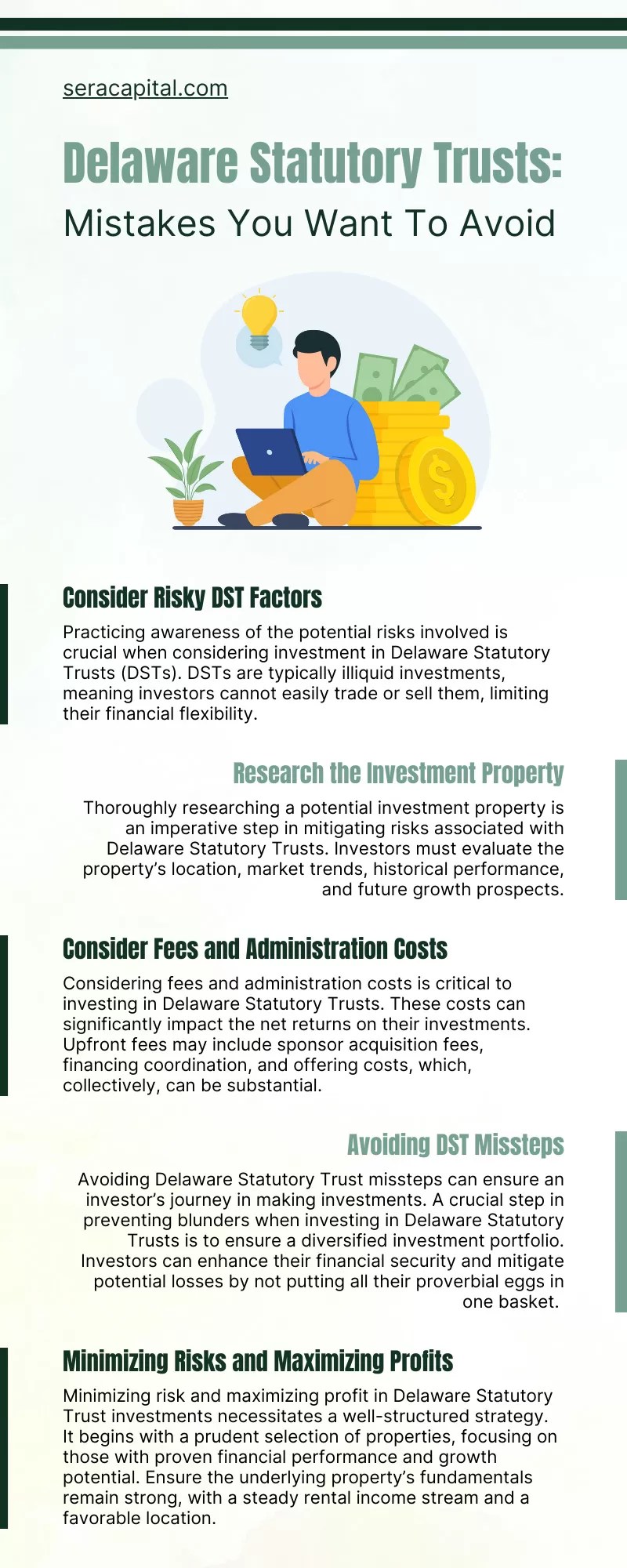Delaware Statutory Trusts: Mistakes You Want To Avoid

Carl E. Sera, CMT
October 10, 2023
Investing in Delaware Statutory Trusts, or DSTs, can help investors obtain diversification, professional management, and reliable returns. DSTs are an attractive option with many benefits, such as cost-efficiency and easy access to commercial real estate investments.
Before taking the plunge into any big real estate investment, however, wise investors should ensure they know the potential pitfalls associated with these trusts. So, here are some mistakes investors should avoid regarding Delaware Statutory Trusts.
Overview of Delaware Statutory Trusts
A Delaware Statutory Trust (DST) is a type of trust created under state law that allows investors to own a portion of a real estate investment without managing it directly.
The DST allows for passive asset ownership and management, potential tax benefits, and liability protection. A trustee responsible for making decisions on behalf of the investors manages the trust by buying and selling property or taking out loans.
Types of Investments Held by DSTs
DSTs can hold various types of investments, including commercial real estate, residential real estate, energy projects, infrastructure projects, and more. Each type has its advantages and disadvantages that investors should consider before making any investments. For example, commercial real estate may provide higher returns but carries greater risk than residential real estate investments.
Benefits of Delaware Statutory Trusts
Investing in a DST offers several advantages over traditional real estate investments. These advantages can include asset protection, tax deferral benefits, liquidity options for investors, and professional management of assets by experienced trustees and advisors.
Additionally, since multiple investors pool their resources together to invest in one property or portfolio of properties, it allows for greater diversification than would otherwise be possible with traditional real estate investments alone.
Investing in a Delaware Statutory Trust
The process for investing in a Delaware Statutory Trust is relatively straightforward, but seeking professional advice can help considerably. The first step is to research available trusts and select one that meets the investor’s needs and objectives based on factors such as expected return, level of risk involved, fees charged by the trustee, and more.
After selecting a trust, investors must complete an application form. This form requires information such as the investor’s name, address, and Social Security Number, along with information about the investor’s financial situation, such as income level and net worth. Once approved, the investor will then deposit funds into the trust account, which they can use to purchase assets according to the terms set out by the trustee.
Tips for Investing in Delaware Statutory Trusts
Here are some mistakes investors should avoid to get the most out of their investments when understanding the basics of Delaware Statutory Trusts. Reviewing potential risks, learning the mistakes, and researching investment properties can help substantially.
Consider Risky DST Factors
Practicing awareness of the potential risks involved is crucial when considering investment in Delaware Statutory Trusts (DSTs). DSTs are typically illiquid investments, meaning investors cannot easily trade or sell them, limiting their financial flexibility.
Moreover, how DSTs perform largely depends on the real estate market, making them vulnerable to economic downturns and market fluctuations. Investors must also be aware of high upfront fees and ongoing management costs associated with DSTs. It is essential to thoroughly evaluate these risk factors and seek professional guidance before committing to a DST investment.
Research the Investment Property
Thoroughly researching a potential investment property is an imperative step in mitigating risks associated with Delaware Statutory Trusts. Investors must evaluate the property’s location, market trends, historical performance, and future growth prospects.
Understanding the property’s vulnerability to economic swings and its positioning in the real estate cycle can provide insights into its potential returns. Furthermore, investors must study the property’s tenancy rates, rental income, and operational costs to ensure a steady revenue stream. Consulting with a trusted financial advisor or a professional real estate investment service can help investors make informed decisions.
Consider Fees and Administration Costs
Considering fees and administration costs is critical to investing in Delaware Statutory Trusts. These costs can significantly impact the net returns on their investments. Upfront fees may include sponsor acquisition fees, financing coordination, and offering costs, which, collectively, can be substantial.
Furthermore, ongoing costs such as property management, trustee, and asset management fees can erode the potential income from investments over time. Therefore, investors must scrutinize all associated costs, understand how they may affect their returns, and factor them into their overall investment strategies. Always seek guidance from a trusted financial advisor or a professional real estate investment service to help assess these costs.
Avoiding DST Missteps
Avoiding Delaware Statutory Trust missteps can ensure an investor’s journey in making investments. A crucial step in preventing blunders when investing in Delaware Statutory Trusts is to ensure a diversified investment portfolio. Investors can enhance their financial security and mitigate potential losses by not putting all their proverbial eggs in one basket. Over-reliance on DSTs can expose an investor’s portfolio to unnecessary risk due to these trusts’ inherent illiquidity and market-dependent nature. Instead, investors must consider balancing their investment strategies with a mix of asset classes, including stocks, bonds, and other real estate investment options.
Additionally, this consideration ensures that investors clearly understand the DST structure, especially its risks and benefits. Misinterpreting DST rules and regulations can lead to undesirable tax consequences and financial loss. Lastly, investors should monitor DSTs and the overall market conditions, adjusting their strategies as needed. Proper planning, continuous learning, and professional guidance can keep investors from the common pitfalls associated with DST investments.
Minimizing Risks and Maximizing Profits
Minimizing risk and maximizing profit in Delaware Statutory Trust investments necessitates a well-structured strategy. It begins with a prudent selection of properties, focusing on those with proven financial performance and growth potential. Ensure the underlying property’s fundamentals remain strong, with a steady rental income stream and a favorable location. Diversification—or having a mix of asset classes—is paramount across various DSTs and to an investor’s portfolio. This strategy can provide a cushion against potential market downturns.
Investors should regularly monitor and adjust their investment portfolios based on market trends and economic indicators. Moreover, having a keen understanding of tax implications associated with DSTs can help optimize their post-tax returns. It is advisable to engage with professional real estate investment services and financial advisors at every step. Their expertise can provide valuable insights, help investors navigate complex financial scenarios, and assist in crafting effective investment strategies to manage risks and enhance profitability.
Sera Capital ensures confidence and transparency for investors who want to diversify their portfolios and increase profits. Our Delaware Statutory Trust services help investors unwind real estate responsibilities and holdings without paying hefty tax bills. Ask about our services today.

Categories
Strategize Your Success
